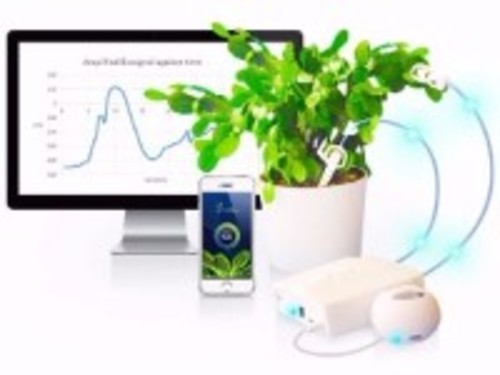Phytl Signs – A new, innovative ‘wearable’ for plants that lets you hear and see your Spider plant communicating
NYON, Switzerland, JULY 20, 2016 – “Don’t forget about me!” Is that what your plants would say to you? With Phytl Signs, an innovative and unique piece of wearable tech for plants, you can find out! Available through the crowdfunding platform Kickstarter, Phytl Signs already has over 130 backers and is over half way to reaching its funding goal. Make a pledge before the 29th July 2016 and join a community of people using this innovative new technology to digitally connect with their plants.
So, how does Phytl Signs work? By amplifying the electrical signals that plants use to communicate internally. Insert a stake into the soil and attach a clip to a leaf. What you hear (through a built-in speaker) and see (via a smartphone app) is the change in voltage of the leaf, relative to the ground, as the plant reacts to its environment. Is your plant thriving, or is it stressed? Is it active or is it quiet? Is it under attack from pests? See and hear how your plants’ signals change as their conditions change. In a nutshell, Phytl Signs is essentially a plant monitor – but it’s unlike any other plant monitor – because it specifically monitors what the plant itself is communicating rather than simply measuring the air temperature or the soil around it.
Hearing and seeing what plants are telling us is, however, just one part of the Phytl Signs story.
“By analysing the signals our plants are using to communicate internally we can start to unlock the messages within them”, says Nigel Wallbridge, Tech entrepreneur and co-founder of Vivent Sárl (the company behind the device). “And to do this we need to ‘crowdsource’ lots of data from lots of people who are fascinated by this tech and its potential to ‘biohack’ the language of plants. Because understanding what plants are saying is exciting for everyone – from those who would like to take better care of their plants, to those interested in nature, the environment, sustainability, the future of food production... the possibilities are far reaching”
Dr Robert Degli-Agosti of the University of Geneva, says “The experiments that people do at home, when collated wisely will provide important pointers for very serious and disciplined academic or industrial research projects.”
Become a Phytl Signs biohacker and join a community of people helping to decode the language of plants. The money you pledge via Kickstarter will buy the tooling and components for the first large production run, and allow the software for the app to be developed so that it is engaging, exciting and easy to use. Phytl Signs will be delivered to backers in April 2017.
-ends-
Media enquiries to:
Elle@rudecommunications.com + 44 (0)778 899 2022
For background information
www.phytlsigns.com/press/background-information
For high-resolution images
www.phytlsigns.com/press/media-images
For the Phytl Signs logo
www.phytlsigns.com/press/phytl-signs-logo
